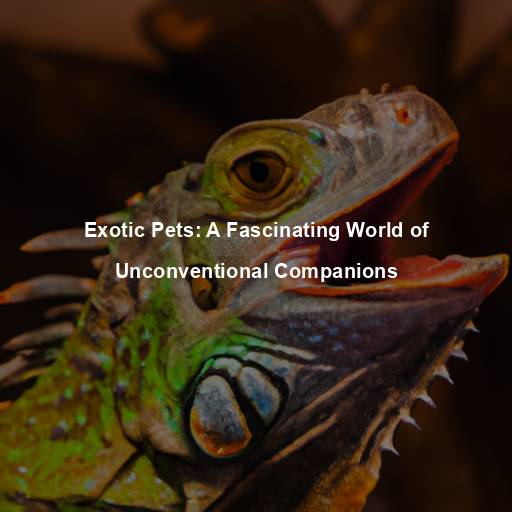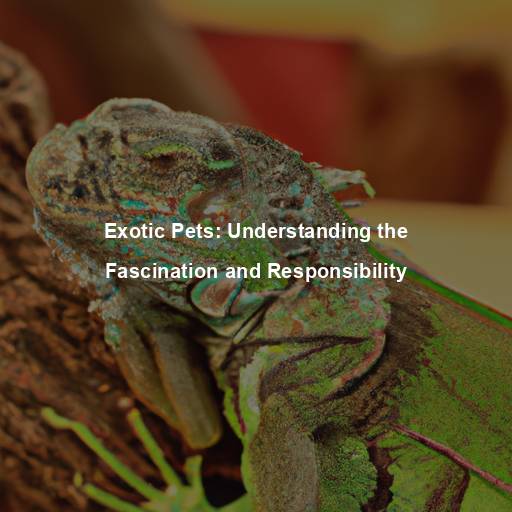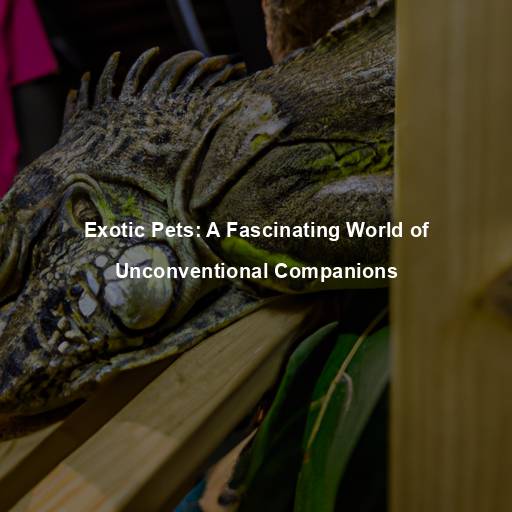Are Exotic Pets Ethical?
Last Updated on July 13, 2023 by Evan
Contents
The Fascination with Exotic Pets
Exotic pets have always captivated the human imagination. From majestic big cats to vibrant tropical birds, the allure of owning a unique and exotic animal can be irresistible. However, the question of whether it is ethical to keep these animals as pets is a complex and contentious one. On one hand, owning an exotic pet can provide a thrilling and exotic experience for the owner.
Understanding Ethical Considerations
Defining Ethical Treatment of Animals
Before discussing the ethics of exotic pet ownership, it is crucial to establish a common understanding of what constitutes ethical treatment of animals. Ethical treatment involves ensuring that the physical and psychological needs of the animal are met, allowing them to live a life free from unnecessary suffering. It also involves respecting the inherent value and rights of animals as sentient beings.
The Welfare of Exotic Pets
When it comes to the fascinating world of exotic pet ownership, the well-being of these extraordinary creatures should never be overlooked. These enigmatic animals posses intricate environmental and social requirements that are far from easy to recreate within the confines of a domestic setting. Take, for instance, the majestic presence of large carnivores like tigers or lions, who demand generous expanses of space, tailor-made diets, and an abundance of enriching activities to truly flourish. The unfortunate reality is that confining these magnificent beings can intensify both their physical and psychological struggles, causing stress, aggression, and even malnutrition to rear their disheartening heads.
The Impact on Wild Populations
The issue of the exotic pet trade raises numerous ethical concerns, especially regarding its detrimental impact on wild populations. The insatiable demand for these unique creatures drives a global industry, which unfortunately thrives on illegitimate and unsustainable practices. Many animals are snatched from their natural habitats, resulting in the decline of wild populations and the disturbance of delicate ecosystems. Furthermore, the transportation and trading of these extraordinary animals often lead to considerable suffering and distress, as negligent handling and insufficient care pave the way for alarming mortality rates.
Perspectives on Exotic Pet Ownership
Supporters of Exotic Pet Ownership
There is a spirited debate surrounding the ownership of exotic pets, with proponents emphasizing the potential for enrichment and education. They contend that a conscientious approach can ensure these captivating creatures enjoy a fulfilling existence while in captivity, benefiting both their owners and the wider public. Furthermore, they argue that responsible ownership plays a crucial role in conservation, through initiatives such as captive breeding programs and the promotion of public awareness. Though this polarizing topic remains a subject of contention, the voices advocating for responsible exotic pet ownership stand firm in their belief in its merits.
Critics of Exotic Pet Ownership
Critics of exotic pet ownership contend that the inherent challenges and risks associated with keeping exotic animals as pets outweigh any potential benefits. They believe that the welfare needs of these animals cannot be adequately met in a domestic environment, leading to physical and psychological suffering. Furthermore, they argue that the exotic pet trade perpetuates the exploitation and commodification of animals, undermining conservation efforts and perpetuating illegal practices.
Ethical Guidelines and Regulations
Existing Laws and Regulations
In light of the complex and ever-evolving topic of exotic pet ownership, various nations have taken proactive steps to tackle the ethical intricacies associated with it. In doing so, they have established a myriad of laws and regulations including permits, specific restrictions based on species, and guidelines pertaining to the housing and care of these unique creatures. While the ultimate goal is to safeguard the well-being of exotic animals, the enforcement and adherence to these rules can be quite disparate, posing a conundrum that demands further exploration and analysis.
Promoting Responsible Ownership
To mitigate the ethical concerns associated with exotic pet ownership, it is essential to promote responsible ownership practices. This includes conducting thorough research on the specific needs and requirements of the desired exotic pet, providing appropriate housing and diet, and seeking guidance from experts in the field. Education and public awareness campaigns can also play a crucial role in fostering a better understanding of the challenges and responsibilities involved in owning an exotic pet.
The Human-Animal Bond
As we embark on a journey to explore the captivating world of exotic pet ownership, a contentious debate ensues. Advocates of this controversial practice confidently assert that the intricate dance between humans and animals knows no boundaries. With tender care and unwavering dedication, they argue that an extraordinary connection, brimming with uncharted possibilities, can be forged between owners and their eccentric companions. And in this enigmatic union, both parties find solace, elation, and a profound sense of purpose.
Individual Rights vs. Animal Welfare
The ongoing discussion surrounding the ownership of exotic pets never fails to ignite a fervent clash of ideals. On one hand, advocates ardently defend the notion that personal liberty should extend to the realm of pet choices, as long as one possesses the means and dedication to cater to their welfare. They assert that individual autonomy ought to encompass the pursuit of unconventional companions, fostering a tapestry of diverse experiences and passions.
Critics, however, highlight that animals have their own inherent rights and that these rights should be prioritized over human desires. They argue that owning exotic pets inherently infringes upon the natural rights and freedoms of these animals, as it restricts their ability to live according to their natural instincts and behaviors.
Conservation and Education Efforts
For those who advocate for keeping exotic pets, a spirited discourse arises regarding their potential contribution to conservation initiatives. Their contention revolves around the notion that responsible ownership can actually aid in preserving endangered species through endorsing captive breeding programs and promoting awareness. Moreover, they assert that the educational aspect of owning these unconventional pets can ignite a profound admiration for wildlife and encourage a broader commitment to conservation among the masses. However, this complex topic remains a subject of ongoing debate, leaving us perplexed about the true impact of exotic pet ownership on conservation efforts.
While some may argue the potential conservation benefits of owning exotic pets, critics raise valid concerns about the overstatement of these claims. They emphasize the importance of prioritizing habitat preservation and providing direct support to conservation organizations as more effective means of safeguarding biodiversity. Moreover, they express understandable unease about the dark side of exotic pet ownership, where for every responsible owner, there lurks an unfortunate multitude that perpetuates illegal wildlife trade and animal exploitation. Such complexities make the matter both perplexing and deserving of thoughtful consideration.
Mitigating Ethical Concerns
Responsible Breeding and Adoption
In light of the moral quandaries surrounding the ownership of exotic pets, the paramount importance lies in advocating for responsible breeding and adoption practices. Breeders must place utmost emphasis on the well-being and vitality of these extraordinary creatures, taking care not to perpetuate issues related to excessive breeding or genetic anomalies. Embracing the alternative route, prospective pet owners should consider adopting from reputable establishments like rescue centers and sanctuaries, fostering a sense of compassion and a departure from commercial markets.
Education and Awareness
In this day and age, it has become increasingly crucial to shed light on the peculiar demands and hurdles faced by our beloved exotic pets. Imparting knowledge and raising awareness is not just a mere suggestion, it is an absolute imperative in nurturing responsible ownership. Prospective owners of these enchanting creatures must embark on a journey of enlightenment, fully immersing themselves in the intricate details of their desired species – from dietary preferences to spatial prerequisites and even the all-important need for socialization. Ingrained in education lies the power to dispel myths and misconceptions, empowering individuals to make informed decisions and fostering an unbreakable connection between them and their exotic companions.
Strengthening Regulations
As we delve into the captivating world of exotic animals, it becomes evident that a delicate balance must be achieved through enhanced regulations and effective enforcement. The pressing need to safeguard biodiversity and halt the illicit trade of endangered species calls for a unified approach between governments, wildlife organizations, and experts. This multifaceted challenge beckons for comprehensive legislation, encompassing meticulous permitting systems, species-specific limitations, and stringent guidelines pertaining to the housing and well-being of these extraordinary creatures. Let us embark on this perplexing journey towards ensuring the welfare of these mesmerizing beings in our midst.
Supporting Conservation Efforts
While the impact of exotic pet ownership on conservation efforts may be debatable, supporting conservation organizations directly can make a more significant difference in preserving biodiversity. By donating to reputable organizations, volunteering in conservation projects, or participating in educational programs, individuals can contribute to the protection of endangered species and their habitats.
Striking a Balance
The ethical considerations surrounding exotic pet ownership are not easily resolved. It requires striking a delicate balance between the desire for unique and exotic experiences and the welfare and conservation of animals. Responsible ownership, education, and effective regulations are key elements in ensuring the well-being of both exotic pets and their wild counterparts.
As society continues to evolve, it is essential to engage in ongoing discussions and critical evaluation of our ethical obligations towards animals. By promoting empathy, compassion, and a deep understanding of the complexities involved, we can strive to make informed decisions that prioritize the welfare and conservation of all creatures, exotic or otherwise. ## Ethical Considerations of Exotic Pet Ownership
FAQs: Are Exotic Pets Ethical
What are exotic pets?
Exotic pets are wild animals that are not commonly kept as pets and mostly originate from regions outside of their natural habitats. These can include reptiles, birds, small mammals, amphibians, and even certain types of insects or arachnids, such as spiders or scorpions.
Is it ethical to keep exotic pets?
When it comes to the intriguing issue of keeping exotic pets, one cannot escape the mind-boggling complexity that ensues. With opinions divided, the ethical dilemma arises, leaving us in a state of perplexity. While some staunchly argue against the practice, highlighting the potential harm it can inflict on the animals and their delicate ecosystems, others find themselves entangled in the web of uncertainties that surround specialized care, diet, and habitat requirements. And let us not forget the mind-twisting consequences of capturing and transporting these enigmatic beings, which can have alarming implications for the very populations that make our natural world so diverse and vibrant.
What are the potential ethical concerns of owning exotic pets?
One of the main ethical concerns associated with exotic pets is the issue of animal welfare. Many exotic species have specific environmental and behavioral needs that are challenging to meet in captivity. A suitable enclosure, proper diet, necessary social interactions, and mental stimulation may often be lacking, leading to stress, illness, and reduced lifespan. Furthermore, some exotic pets may pose a safety risk to their owners and others due to their natural instincts or specialized care requirements.
Are there any exemptions to the ethical concerns?
While arguments against keeping exotic pets are strong, some people argue that in certain cases, reputable organizations or individuals can provide appropriate care and conservation efforts for these animals. Accredited zoos, wildlife sanctuaries, and professional breeders who prioritize animal welfare, conservation, and education can sometimes play a positive role in keeping and breeding certain exotic species responsibly. However, it remains crucial to thoroughly research such institutions and ensure that they are dedicated to ethical practices.
How can one ensure ethical treatment of exotic pets?
When it comes to keeping an exotic pet, there are many factors to take into consideration that can leave one feeling both captivated and perplexed. Thorough research is key, as understanding the individual needs of these remarkable creatures is of paramount importance. It is crucial to reflect upon whether the species in question is suited for life in captivity, as well as the necessary requirements for their habitat, diet, social interactions, and potential veterinary care. To ensure the ethical treatment of these extraordinary companions, it is imperative to obtain them from legal and reputable sources, ensuring that they have been bred in captivity rather than plucked from their natural habitats. Additionally, regular veterinary check-ups, providing an environment that is both enriched and reflective of their natural habitats, and employing responsible handling and care practices are all essential components of promoting the welfare and well-being of these exotic pets.
Should exotic pets be banned altogether?
The debate surrounding the prohibition of exotic pets is a tangled web of contradictory viewpoints. On one side, advocates demand a sweeping ban, citing the myriad complications and dangers that come with confining wild creatures in captivity. However, there exists a counterargument, boldly asserting that responsible ownership and education have the power to assuage ethical reservations. A potential compromise lies in the form of stringent regulations, permits, and a concerted educational push to ensure the well-being of these extraordinary species while accommodating the human desire for unconventional pets.
Please note that the information below is intended for educational purposes only and should not be taken as professional advice. Before making any decisions regarding the adoption of an exotic pet, it is crucial to seek guidance from qualified professionals and familiarize yourself with the laws and regulations in your area to ensure the safety and well-being of both the animal and yourself. Animal welfare should be the top priority when considering such a commitment, so take the time to gather all the necessary information before making any final decisions.







